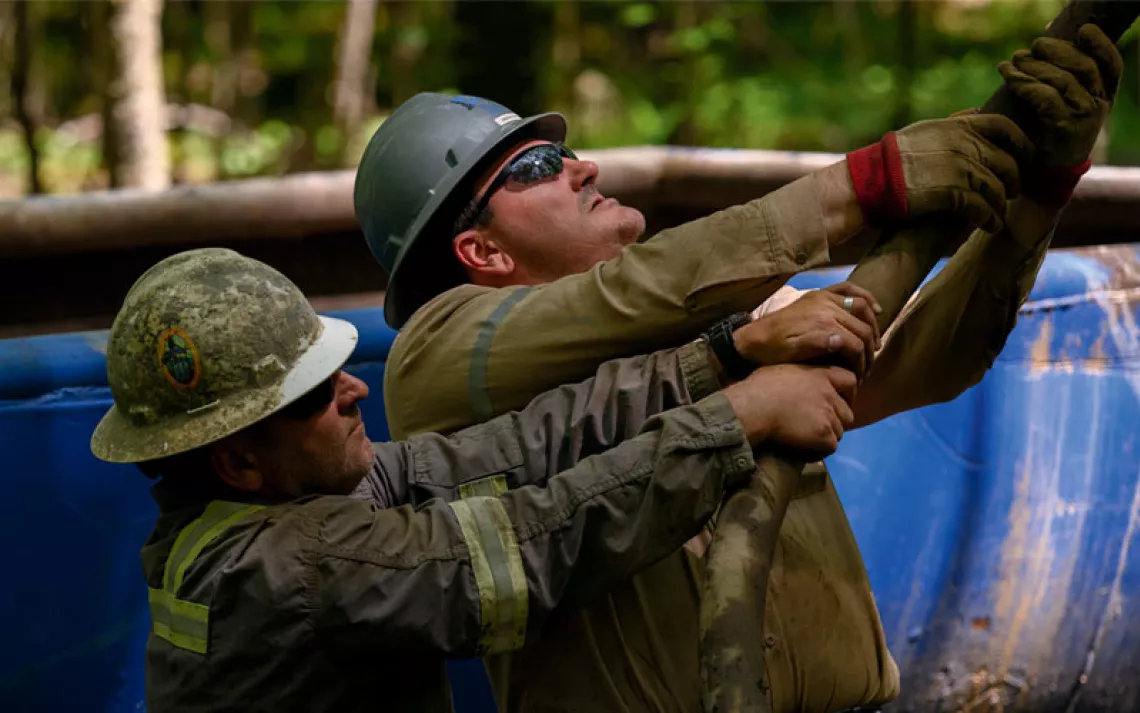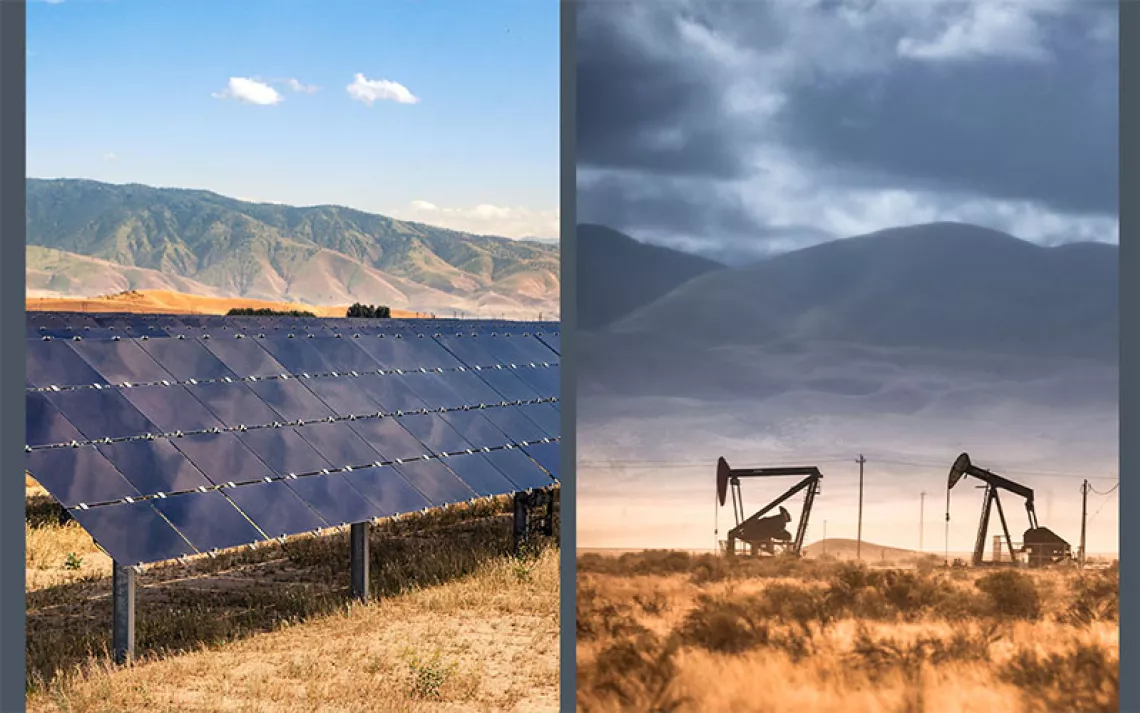Heard This One? GOP Pushing for Oil Drilling in Arctic Refuge
Congress tries to use budget process to drill in Arctic National Wildlife Refuge

Photo by troutnut/iStock
It feels like déjà vu all over again. For nearly 30 years, some congressional Republicans have been attempting to open up parts of the Arctic National Wildlife Refuge to oil and gas drilling—and they’re at it once more.
In 1995, the Republican-controlled Congress passed a measure to open up a section of the refuge’s coastal plain to the fossil fuel industry, only to see President Bill Clinton block the move with a veto. Ten years later, in 2005, the GOP again attempted to push through a law allowing oil activity in parts of the refuge; a filibuster led by Senator Maria Cantwell, a Democrat from Washington State, quashed that effort. With Republicans in command of both houses of Congress and President Donald Trump promoting an “energy dominance” agenda, fossil fuel interests now believe they have their best opportunity in years to achieve their goal.
On Thursday, the House approved a 2018 budget resolution that includes a provision calling for billions of dollars in new revenue from the sale of oil and gas leases—a veiled move to allow oil extraction in the Arctic refuge. Also on Thursday, the Senate Budget Committee approved a budget that would open the way for drilling in the largely untouched northern wilderness; the full Senate will begin considering the proposed budget the week of October 16.
Veteran conservation advocates say that the ecological integrity of the Arctic National Wildlife Refuge—a 19.2-million-acre wilderness between Alaska’s Brooks Range and the Arctic Ocean—has never been in greater danger.
“This is the most dire threat the Arctic refuge has ever faced,” says Lydia Weiss, government relations director for the Wilderness Society. “This entire administration has made clear that they have one use for our shared public lands, and that is taking them from the people and giving them to their billionaire oil industry friends. With a Congress that is all too eager to abide, the fate of the refuge is really in peril.”
The Arctic National Wildlife Refuge is one of the few remaining wild places in the United States where biological processes continue much as they have for millennia. The vast sweep of mountains, tundra, and braided rivers flowing to the Arctic Ocean is home to grizzly bears, musk oxen, dall sheep, wolves and foxes, and the 110,000-member porcupine caribou herd that makes a massive migration through the refuge annually. In the summer, huge flocks of birds—including species that migrate over thousands of miles—congregate in the refuge.
“There is no human activity there—no Starbucks, no T-shirt shops,” says Athan Manuel, director of the Sierra Club’s lands protection program. “It exists today the way it did 1,000 years ago or 5,000 years ago. You can’t say that about anywhere else in the U.S. And that’s an American thing—to protect something like this that is one of a kind, just like Yellowstone or Yosemite or the Everglades.”
While much of the refuge is protected as federally designated wilderness (the Mollie Beattie Wilderness within the refuge is 8 million acres in size, the second largest in the U.S.), a 1.5-million-acre section along the coast is designated as a “study area” for oil and gas exploration. Oil companies say (or hope) that the area—know as the 1002 in bureaucratic speak—might contain significant oil and gas deposits, and they’ve long sought legal permission to drill there. Environmentalists and Alaska Natives like the Gwich’in people counter that drilling would unnecessarily shatter the region’s ecology by, among other things, impacting the calving grounds of the caribou.
“We have a spiritual, cultural connection with the caribou herd that dates back as far as 20,000 years ago. Our people used to migrate with the porcupine caribou herd, and our ancestors settled us on the caribou route,” says Bernadette Demientieff, executive director of the Gwich’in Steering Committee. Demientieff says that for the Gwich’in—an indigenous group whose lands straddle the United States–Canada border in the Brooks Range north of the Yukon River—protection of the Arctic refuge is also a food security issue, as tribal members still derive up to 80 percent of their calories from hunting. “This is our way of life. This is our human right and our food security. Our identity is not up for negotiation, not for any amount of money or any amount of oil.”
The current effort to open up the refuge’s coastal plain to oil drilling relies on what environmental groups say is some parliamentary mischief. Republicans, led by Senator Lisa Murkowski and Representative Don Young, both of Alaska, are seeking to greenlight oil extraction by including the measure in the 2018 budget resolution, which under Senate rules only needs a simple majority to pass, as opposed to the 60-vote majority normally required for bills to get through the Senate. To help pay for the White House’s proposed $1.5 trillion in tax cuts, congressional leaders have directed budget writers to identify possible new sources of federal revenue. (It’s worth noting that much of the White House’s tax cuts would go toward the ultra-rich; according to an analysis by the Tax Policy Center, about 80 percent of all Trump tax cuts would go to the wealthiest 1 percent, while an estimated one-quarter of households would actually experience a tax increase.) Senator Murkowski claims that opening up the refuge to drilling would result in additional monies going toward federal coffers, and so has sought to include oil lease sales as part of this year’s budget process. “This provides an excellent opportunity for our committee to raise $1 billion in federal revenues while creating jobs and strengthening our nation’s long-term energy security,” Murkowski told reporters last week.
Environmental advocates on Capitol Hill say Murkowski’s attempt to attach the Arctic drilling measure to the budget is a way of dodging public debate on the controversial proposal—a debate that, greens say, Murkowski would lose. “This issue has been debated for more than 30 years, and to sneak it into a bill that can’t be debated is the kind of abuse of power and process that Americans so loathe from the Congress,” Weiss says.
Conservation groups also complain that the House and Senate’s draft budget figures on revenue from oil drilling in the refuge rely on some unrealistic expectations. According to the Audubon Society, achieving President Trump’s goal of raising $1.8 billion in federal revenue from Arctic refuge drilling would require that every one of the 1.5 million acres in the coastal plain be auctioned off—for many times the market rate. During the last major auction of federal oil leases on Alaska’s North Slope, the average bid was about $28.25 per acre. To meet the president’s goal, leases would have to sell for about $2,400 per acre. “The numbers they are using are so phony and fuzzy,” the Wilderness Society’s Weiss says.
The conservation groups and Alaska Native communities seeking to defeat the oil drilling proposal face some daunting political arithmetic. During the George W. Bush–era fight over the fate of the Alaska National Wildlife Refuge, environmentalists were able to enlist the support of moderate Republicans in the Senate to help defend the region. A dozen years later, thanks to the continuing lurch of the GOP toward the hard right, moderate Republicans have become the political equivalent of an endangered species. Only two Senate Republicans are on the record firmly opposing drilling in the Arctic refuge: Susan Collins of Maine and John McCain of Arizona. And even if they vote against the measure, Vice President Mike Pence would be a tie-breaking vote.
So environmental organizations are mounting a major grassroots lobbying campaign to get citizens to contact their senators and urge them to vote against any budget that includes measures that allow oil drilling in the Arctic refuge. “This is the most important moment we’ve ever had,” says the Sierra Club’s Manuel. “We have a lot of urgency here. We need people to get fired up again about protecting the refuge.”
 The Magazine of The Sierra Club
The Magazine of The Sierra Club



